 In an unnamed Middle Eastern state, Alif is a grey-hat hacker who provides online privacy and security. But then his aristocratic lover sends him an ancient book of fairy tales, and shortly thereafter he's on the run for his life. His only allies are his childhood friend Dina, an old sheikh, and oh yes, Vikram the Vampire.
In an unnamed Middle Eastern state, Alif is a grey-hat hacker who provides online privacy and security. But then his aristocratic lover sends him an ancient book of fairy tales, and shortly thereafter he's on the run for his life. His only allies are his childhood friend Dina, an old sheikh, and oh yes, Vikram the Vampire. The first 90% of this book is great. Fast paced, with believable characters and innovative and evocative descriptions. But. The last section of the book feels untrue and unearned, as the protagonists win everything they wanted, Alif's aristocratic lover proves herself false and easy to turn away from, mob violence only kills the baddies, etc. The ending feels too easy.
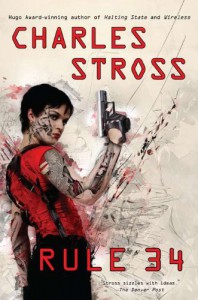 Any story that follows at least seven different characters and is told entirely in the 2nd person would drive me mad. Stross is also guilty of pages worth of infodumps about made-up AIs. His characters' internal monologues are nearly indistinguishable and utilize strained, over-long metaphors that aren't nearly as clever as Stross thinks they are. The characters themselves are each a unique blend of characteristics, but in the end the only one I was even slightly interested in was the psychopath criminal, which I doubt was intended. And the AI's pov is the stupidest one I've heard yet.
Any story that follows at least seven different characters and is told entirely in the 2nd person would drive me mad. Stross is also guilty of pages worth of infodumps about made-up AIs. His characters' internal monologues are nearly indistinguishable and utilize strained, over-long metaphors that aren't nearly as clever as Stross thinks they are. The characters themselves are each a unique blend of characteristics, but in the end the only one I was even slightly interested in was the psychopath criminal, which I doubt was intended. And the AI's pov is the stupidest one I've heard yet.So no, I didn't like this. It gets 2 stars from me on the basis that Stross is clearly trying to use new character types and I liked the economics subplot. But overall I found this to be turgid, boring, and a serious slog to get through.
 A collection of stories by mostly well-known authors, purportedly all detectives in urban fantasy stories. In actual fact, many of these stories are not set anywhere near cities, several have no magical or supernatural elements, and at least two are neither urban nor fantasy. So I'm not actually sure what selection criteria GRR Martin was using. I don't feel like I wasted my time reading this, but I also don't feel particularly satisfied. I really liked seeing more of Kyle and Warren in Briggs's "In Red, with Pearls", although too many of the clues were unstated so that the mystery's end could be surprising. My favorite of this collection was Hanover's "The difference between a puzzle and a mystery," which was creepy but somehow also comforting.
A collection of stories by mostly well-known authors, purportedly all detectives in urban fantasy stories. In actual fact, many of these stories are not set anywhere near cities, several have no magical or supernatural elements, and at least two are neither urban nor fantasy. So I'm not actually sure what selection criteria GRR Martin was using. I don't feel like I wasted my time reading this, but I also don't feel particularly satisfied. I really liked seeing more of Kyle and Warren in Briggs's "In Red, with Pearls", although too many of the clues were unstated so that the mystery's end could be surprising. My favorite of this collection was Hanover's "The difference between a puzzle and a mystery," which was creepy but somehow also comforting.
 I really liked Hanover's short story in [b:Down These Strange Streets|10559622|Down These Strange Streets|George R.R. Martin|http://d.gr-assets.com/books/1311280365s/10559622.jpg|15466372], so I'm going to check out his books.
I really liked Hanover's short story in [b:Down These Strange Streets|10559622|Down These Strange Streets|George R.R. Martin|http://d.gr-assets.com/books/1311280365s/10559622.jpg|15466372], so I'm going to check out his books.
 Worsley tracks the people and art that populated the courts of George I and II of England. She has a very easy to read style, but cites well and was able to draw upon a good number of first-person sources. That said, there were three things I distinctly disliked about this book.
Worsley tracks the people and art that populated the courts of George I and II of England. She has a very easy to read style, but cites well and was able to draw upon a good number of first-person sources. That said, there were three things I distinctly disliked about this book. One, Worsley has a completely unearned appreciation for George II and his wife Caroline. Both of them seem to have been thoroughly unpleasant in several arenas, not least their treatment of their immediate family. The abuse, lack of support, and outright hatred shown by each of them toward their children soured me on both of them. In vain were Worsley's repeated reminders that Caroline was bffs with philosophers, or her assertion that George II's lack of reaction to Prince Frederick's death was due to "rigid royal training" (how then to explain his inattention to the funeral? Or for that matter, where was his "rigid royal training" during the ~70 years of George II throwing tantrums and exploding into feuds at the slightest instigation?).
Two, the politics, laws and wars of the age get hardly a mention. Surely actual events were just as important to understanding the Georgian court as knowing that the royal mistresses' rooms were damp?
And three, truly hideous line drawings interrupt the text to illustrate various personages. Not only do these drawings make everyone look like lumpy potatoes, but they also bear no resemblance whatsoever to their subjects' other portraits. What use ARE they? A poor choice, and an unnecessary one, given the good range and number of color paintings included.
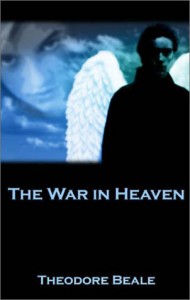 Beale is one of the few authors I absolutely will never ever read, for claiming that (among his other racist and sexist assertions) all black people are savages and not human. For example.
Beale is one of the few authors I absolutely will never ever read, for claiming that (among his other racist and sexist assertions) all black people are savages and not human. For example.
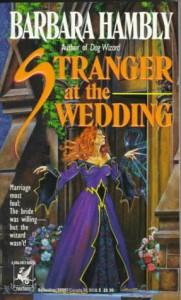 Ignore the terrible cover. This is an excellent, sophisticated book.
Ignore the terrible cover. This is an excellent, sophisticated book. Kyra's magical studies are interrupted by premonitions of her sister's death. Determined to save her younger sister, Kyra returns to her merchant family's home, even though they killed her teacher and disowned her years before.
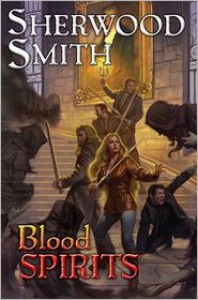 Kim is the granddaughter of a long-lost princess, but in a noble gesture she turned down a chance at love and Dobrenica's throne. She returned to the US to recover from the tumultuous events of [b:Coronets and Steel|7830913|Coronets and Steel (Dobrenica, #1)|Sherwood Smith|http://d.gr-assets.com/books/1348532088s/7830913.jpg|10893363], only to have a strange vision of her cousin. Afraid something terrible has happened, she races to Dobrenica and discovers that her cousin has died in a mysterious car accident, and her husband (formerly Kim's love interest) is the primary suspect. Kim is sure something fishy is going on, and sure enough, all the obvious stuff has gone down--the mysterious bastard cousin has been making a play for the throne, as has the endlessly annoying Tony. (Tony is one of my major frustrations with this series, actually, because he is constantly making armed coup attempts, and yet everyone still trusts and socializes with him. Plus, the story seems to think he's a charming rogue that Kim is attracted to despite herself, whereas to me he's her creepy cousin who's not nearly as smart as he thinks he is. The fact that he's jumped to drastically incorrect conclusions and started holding guns to people's heads as a result in BOTH BOOKS supports my interpretation.) Less expected are the supernatural elements in this book; they work well, and were my favorite part of the story. If this series continues, I hope we get more interaction between Kim and Alec, and perhaps Tony will have a fatal accident or two.
Kim is the granddaughter of a long-lost princess, but in a noble gesture she turned down a chance at love and Dobrenica's throne. She returned to the US to recover from the tumultuous events of [b:Coronets and Steel|7830913|Coronets and Steel (Dobrenica, #1)|Sherwood Smith|http://d.gr-assets.com/books/1348532088s/7830913.jpg|10893363], only to have a strange vision of her cousin. Afraid something terrible has happened, she races to Dobrenica and discovers that her cousin has died in a mysterious car accident, and her husband (formerly Kim's love interest) is the primary suspect. Kim is sure something fishy is going on, and sure enough, all the obvious stuff has gone down--the mysterious bastard cousin has been making a play for the throne, as has the endlessly annoying Tony. (Tony is one of my major frustrations with this series, actually, because he is constantly making armed coup attempts, and yet everyone still trusts and socializes with him. Plus, the story seems to think he's a charming rogue that Kim is attracted to despite herself, whereas to me he's her creepy cousin who's not nearly as smart as he thinks he is. The fact that he's jumped to drastically incorrect conclusions and started holding guns to people's heads as a result in BOTH BOOKS supports my interpretation.) Less expected are the supernatural elements in this book; they work well, and were my favorite part of the story. If this series continues, I hope we get more interaction between Kim and Alec, and perhaps Tony will have a fatal accident or two.
 Wilson has written a comprehensive guide to adulterations, alterations, and substitutions made to our food, ranging from Romans sweetening wine with lead to GMO crops in the modern day. Fascinating! (My status updates contain the examples that most struck me.) Wilson's theory is that there will always be attempts to save money or effort by cheating or changing how food is made. Particularly, swindles like making fake eggs out of chemicals or fake tea by carefully coloring and curling tree leaves will happen when the costs of raw materials are high and human labor is cheap. The most effective ways to prevent these counterfeits are: make people aware of what quality food tastes like, so they are aware of when they're lied to. Someone who knows what real milk tastes like is a lot less likely to pay money for whitened water, for instance. Put regulations in place to protect consumers, as in the medieval guild systems or through the government. Regulators have to test constantly and stay on the forefront of science, and these regulations have to have serious consequences. It seems relatively simple, but Wilson documents how time and time again, just agreeing on regulations is hardly done, and even then, enforcement starts strong and rapidly becomes lax or outmoded.
Wilson has written a comprehensive guide to adulterations, alterations, and substitutions made to our food, ranging from Romans sweetening wine with lead to GMO crops in the modern day. Fascinating! (My status updates contain the examples that most struck me.) Wilson's theory is that there will always be attempts to save money or effort by cheating or changing how food is made. Particularly, swindles like making fake eggs out of chemicals or fake tea by carefully coloring and curling tree leaves will happen when the costs of raw materials are high and human labor is cheap. The most effective ways to prevent these counterfeits are: make people aware of what quality food tastes like, so they are aware of when they're lied to. Someone who knows what real milk tastes like is a lot less likely to pay money for whitened water, for instance. Put regulations in place to protect consumers, as in the medieval guild systems or through the government. Regulators have to test constantly and stay on the forefront of science, and these regulations have to have serious consequences. It seems relatively simple, but Wilson documents how time and time again, just agreeing on regulations is hardly done, and even then, enforcement starts strong and rapidly becomes lax or outmoded.
 Anna is a young waitress who was forcibly Changed into a werewolf. Her pack abuses and rapes her, but the final straw is the death of a teenager. Anna calls in the Marrock's enforcer, Charles. He immediately sees how twisted and abusive the pack has become, and with Anna's help he kills the baddies.
Anna is a young waitress who was forcibly Changed into a werewolf. Her pack abuses and rapes her, but the final straw is the death of a teenager. Anna calls in the Marrock's enforcer, Charles. He immediately sees how twisted and abusive the pack has become, and with Anna's help he kills the baddies.I love Briggs's Mercy Thompson series, so I was thrilled to find a new series set in the same world. But alas, I really disliked this. Anna is such a sad-sack that I actually started giggling at her woebegone, martyred POV at one point. She's basically Little Nell. Charles, whose main traits seem to be his Native heritage and long black hair, isn't any more interesting. The mystery of what messed up Anna's werewolf pack is so, so incredibly obvious that I was insulted either character wasted a page wondering about it, let alone making it stretch the entire book. Not much plot! Not much characterization! Just a whole lot of Anna and Charles looking at each other, wishing the other one liked them.
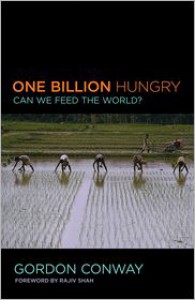 In this ambitious work, Conway sets up the current issues of hunger, displacement and water insecurity that face the world, then takes the reader through a step-by-step process of how to fix these problems. His main points concern the following: most agriculture in the developing world is conducted by smallholders, who weather all of the risk of farming but can't respond quickly to market forces. He recommends that insurance be set up for these farmers, and also that they're linked more directly to information about prices and weather. Water is being unsustainably used for irrigating crops, and he has compiled a set of tools to reduce water use (the most obvious recourse being to increase maintenance of existing irrigation infrastructure). Industrial methods of fertilizer and pest control are expensive and bad for the environment and biome, so he recommends crop rotation, interleaving crops together, and using either natural pest control or gene modification (making crops exude Bt, for instance). And international donors need to actually follow up on their promises and work within a larger organization, so that efforts can be coordinated.
In this ambitious work, Conway sets up the current issues of hunger, displacement and water insecurity that face the world, then takes the reader through a step-by-step process of how to fix these problems. His main points concern the following: most agriculture in the developing world is conducted by smallholders, who weather all of the risk of farming but can't respond quickly to market forces. He recommends that insurance be set up for these farmers, and also that they're linked more directly to information about prices and weather. Water is being unsustainably used for irrigating crops, and he has compiled a set of tools to reduce water use (the most obvious recourse being to increase maintenance of existing irrigation infrastructure). Industrial methods of fertilizer and pest control are expensive and bad for the environment and biome, so he recommends crop rotation, interleaving crops together, and using either natural pest control or gene modification (making crops exude Bt, for instance). And international donors need to actually follow up on their promises and work within a larger organization, so that efforts can be coordinated.Conway has been president of the Rockefeller Foundation, chief scientific adviser to the UK Department for International Development, and is now working as a professor while running an advocacy grant from the Bill&Melinda Gates Foundation. He writes dense prose, packed with citations and real world examples, but also rife with quotable sections. For anyone worried about sustainability, hunger, or agriculture, I highly recommend this book. It's far less angry and less radical than Paul Farmer's writing, but it's nevertheless a good companion to it.
 Shelby is young but determined. She's passionate about the history of her hometown, and hopes that her articles will get people interested in the decaying splendor of the area. But then Ransom, a well known historian, rips her first book to shreds, and her hopes of tenure seem lost. To make matters worse, Ransom is taking his sabbatical at her very own university! Inevitably they run into each other, but to each other's surprise they have more in common than either expected.
Shelby is young but determined. She's passionate about the history of her hometown, and hopes that her articles will get people interested in the decaying splendor of the area. But then Ransom, a well known historian, rips her first book to shreds, and her hopes of tenure seem lost. To make matters worse, Ransom is taking his sabbatical at her very own university! Inevitably they run into each other, but to each other's surprise they have more in common than either expected.I was impressed at the way Hathaway worked in elements of P&P without being slavish about it; the academic setting provides an excellent reason for both their initial antipathy and later rapport. Shelby and Ransom's relationship develops in a tantalizing series of fits and starts. But the easy, natural pace of the novel becomes rapid and ham-handed about 80% in, and the rest of the book was far less satisfying. Currently free on amazon.
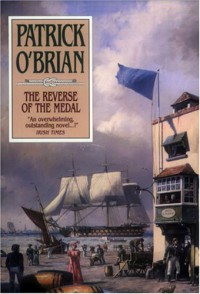 Captain Jack Aubrey and his particular friend, Dr. Steven Maturin, return to England. Within days of his arrival, Jack's credulous nature (at least on land) and kind heart put him in the crosshairs of a political scandal. While he withstands imprisonment and trial, Steven tries to figure out the truth of the matter.
Captain Jack Aubrey and his particular friend, Dr. Steven Maturin, return to England. Within days of his arrival, Jack's credulous nature (at least on land) and kind heart put him in the crosshairs of a political scandal. While he withstands imprisonment and trial, Steven tries to figure out the truth of the matter.Another beautifully written novel from O'Brian.
 Mercy's life as one of the few Walkers left, as well as the wife of the most public werewolf Alpha, is never simple. After her husband and the rest of his pack are abducted, she calls in favors from the fey and vampires she's helped over the years and starts hunting them down. Eventually, it becomes clear that their kidnapping was part of a much larger scheme to weaken the local vampires. To prevent a necromantic vampire from taking over the area (and eventually, starting a war with humanity), Mercy throws in her lot with the incredibly creepy and manipulative Marisila. (And can I just say, I love that Marisila looks like the typical barely-teenaged, blond-ringleted beautiful vampire girl, but that her fighting style is pure bare-knuckle dirty boxing?)
Mercy's life as one of the few Walkers left, as well as the wife of the most public werewolf Alpha, is never simple. After her husband and the rest of his pack are abducted, she calls in favors from the fey and vampires she's helped over the years and starts hunting them down. Eventually, it becomes clear that their kidnapping was part of a much larger scheme to weaken the local vampires. To prevent a necromantic vampire from taking over the area (and eventually, starting a war with humanity), Mercy throws in her lot with the incredibly creepy and manipulative Marisila. (And can I just say, I love that Marisila looks like the typical barely-teenaged, blond-ringleted beautiful vampire girl, but that her fighting style is pure bare-knuckle dirty boxing?)There are two great things about this series: one, the characters are well developed and very individualized, none more so than Mercy. They're memorable, easy to tell apart, and Briggs has made me care about them. Their relationships with each other feel real. The other is that Briggs isn't afraid to let her series and characters change. It keeps the series feeling fresh and exciting, even after 7 books. The plots are complicated enough to be interesting and always paced well, and the dialog reads naturally. Of all the "urban fantasy"/"paranormal romance" series that have come out in the last ten years, this is one of my favorites.
 Ivan Vorpatril, the Bertie Wooster of the Vorkosigan saga, gets his very own book. It is, alas, really light-weight. There are bounty hunters, hidden treasure, double-crosses, and several romances, but there wasn't a single moment of fear or tension. I never worried that Ivan would be hurt or die, or that Tej (the Jacksonian on the run after her family's House gets taken over will break his heart. This is set before [b:Cryoburn|7841670|CryoBurn (Vorkosigan Saga, #14)|Lois McMaster Bujold|http://d.gr-assets.com/books/1269879970s/7841670.jpg|10621859], so this contains no fall out from the events of that book. The Barrayarans' dialog is almost exclusively going over their family histories. I was amazed anyone could stand to have a dinner conversation with a single Vor, given that in this book all they do is reminisce.
Ivan Vorpatril, the Bertie Wooster of the Vorkosigan saga, gets his very own book. It is, alas, really light-weight. There are bounty hunters, hidden treasure, double-crosses, and several romances, but there wasn't a single moment of fear or tension. I never worried that Ivan would be hurt or die, or that Tej (the Jacksonian on the run after her family's House gets taken over will break his heart. This is set before [b:Cryoburn|7841670|CryoBurn (Vorkosigan Saga, #14)|Lois McMaster Bujold|http://d.gr-assets.com/books/1269879970s/7841670.jpg|10621859], so this contains no fall out from the events of that book. The Barrayarans' dialog is almost exclusively going over their family histories. I was amazed anyone could stand to have a dinner conversation with a single Vor, given that in this book all they do is reminisce.It was an enjoyable enough read, with likable characters, but it felt artificial and flimsy after the psychological insights and true dangers in most of the other Vorkosigan novels.
 Peter Grant is at the end of his probationary period as a London cop, but instead of getting on the detective track, his distractability and curiosity puts him next in line to be a paper pusher. Luckily, it's about this time he discovers he can see ghosts, and he's rapidly snatched up by Inspector Nightingale, the only magician on the force. Now instead of filling out paperwork he's running around London trying to stop a killer who uses the supernatural to incite violence.
Peter Grant is at the end of his probationary period as a London cop, but instead of getting on the detective track, his distractability and curiosity puts him next in line to be a paper pusher. Luckily, it's about this time he discovers he can see ghosts, and he's rapidly snatched up by Inspector Nightingale, the only magician on the force. Now instead of filling out paperwork he's running around London trying to stop a killer who uses the supernatural to incite violence.Peter Grant is a great main character, well crafted and already showing a lot of depth. The magic systems are intriguing--there's a whole subplot about the personifications of the Thames getting into fights, and another subplot in which Peter applies the scientific method to magic, to everyone's bemusement. The main plot is scary, macabre, and a bit weird. Just what I like to see in urban fantasy! And perhaps best of all, this book is seriously funny. Not in a way that distracts from the plot or characters, but in a way that shows them off.

